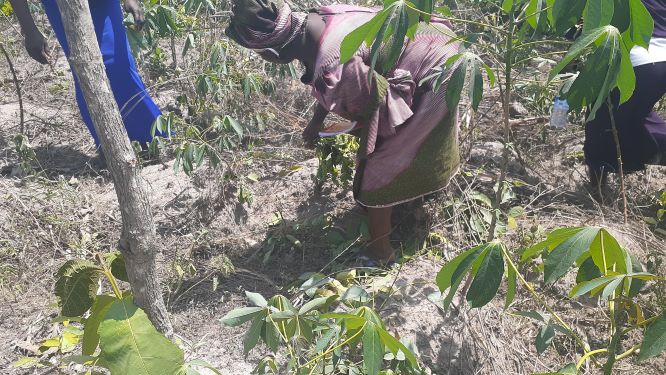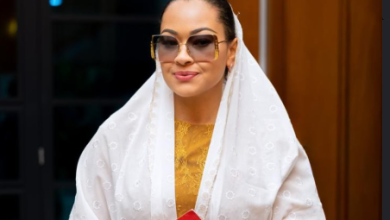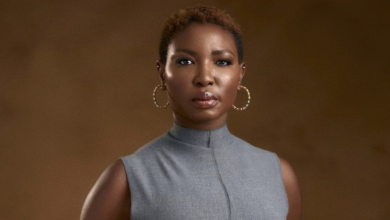Jigawa Female Farmers Face Gender Discrimination, Land Encroachment, and Limited Resources

|
Getting your Trinity Audio player ready...
|
Ramatu Dahiru is a smallholder farmer who faces challenges as a woman farmer in Jigawa state. She annually cultivates acres of land growing millet, sorghum, groundnut, beans, and other cash crops. Last year, a neighbour encroached on her farmland, delaying crop cultivation. Despite seeking intervention from community leaders, Dahiru faces land disputes, which she partly attributes to gender discrimination.
“My neighbour felt that because I am a woman and there’s nothing I can do about it, he simply encroached on parts of my land by farming there, thus extending his own into mine unfairly,” Dahiru said as she took the ICIR’s reporter Khadija Ishaq Bawas around the farm.
At the start of the rainy season, which marks the beginning of the farming cycle, Dahiru told the journalist that she was worried about the probable occurrence of the same problem. The earlier conflict required multiple interventions to resolve, causing a delay in her cultivation.
Dahiru explained that the delay in accessing her farmland frustrated her efforts to earn income from her produce. Although she had previously sought the assistance of community leaders, she still experienced encroachment on her land, which she partly linked to being a woman farming in a region traditionally controlled by men.
Due to the unauthorised seizure of their farmland, Dahiru and other farmers also lack a consistent source of produce, which significantly restricts their access to markets vital for selling crops competitively, earning steady income, and reinvesting in their agricultural activities.
Even when they succeed in harvesting their crops, they face significant barriers, including inadequate transportation, insufficient storage facilities, and a lack of market information systems, which severely hinder their ability to transport and store their produce effectively. The lack of adequate infrastructure not only limits their ability to access markets but also obstructs their participation in value-added activities, such as processing and marketing, which could substantially boost their income and economic opportunities.
As an active participant in the Small-Scale Women Farmers Organisation in Nigeria (SWOFON), Dahiru points out the gender gap in resource allocation.
“For example, the government might allocate just ten bags of fertiliser for over 100 women to divide among themselves. How is that adequate?” she questioned.
Dahiru’s story reflects the broader struggles of women farmers in a male-dominated industry. They are often left out of fair resource distribution, like fertilisers and equipment, and lack proper storage facilities, which forces them to sell crops at low prices immediately after harvest. These challenges are intensified by limited access to legal support and market opportunities, which hinder their economic growth.
Section 1.3, sub-section 5 of the National Policy on Gender in Agriculture, condemns all forms of gender-based violence in the agricultural sector. This aligns with the Nigerian National Gender Policy in Agriculture, as highlighted in the 2019 CGIAR Research Programme on Policies, Institutions, and Markets Annual Report.
This policy aims to promote the adoption of gender-sensitive and responsive approaches in the agricultural sector and ensures that men and women have equal access to and control of product resources. It recognises the need to address and eliminate violence against women in agriculture, ensuring a safe and conducive environment for their participation. However, there is no indication of how this policy is being enforced for women like Dahiru, who says that only the intervention of community leaders has some effect on addressing the persistent challenges they face.
Prior to the policy, female farmers faced numerous challenges. They often lacked access to land ownership, credit facilities, and essential tools like water pumps and storage silos. Additionally, limited negotiation skills left them vulnerable to unfair pricing for their produce. The National Gender Policy seeks to address these issues by promoting equal access to resources, training programmes, and legal representation.
Jigawa’s agricultural sector has introduced initiatives like the NG-Cares programme aimed at empowering farmers post-COVID-19, but questions remain over the inclusivity of women in these efforts. The National Gender Policy on Agriculture advocates for gender equality, but its impact appears insufficient for many women like Dahiru, who remain marginalised in accessing agricultural resources and markets.
Agricultural experts and local officials agree that the key to overcoming these barriers lies in stronger enforcement of gender policy, improved legal protection, and equitable access for women to essential resources, training, and technology. As gender disparity continues to hinder women’s potential in agriculture, a more concerted effort from the government and stakeholders is needed to ensure a fairer agricultural future for all.
Editor’s note: Khadija Ishaq Bawas produced this story for the International Centre for Investigative Reporting, where it was first published.




